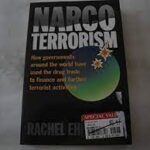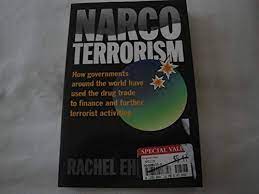Narco-terrorism represents a complex and multifaceted threat that intersects the realms of illicit drug trafficking and terrorism, posing significant challenges to national security, public safety, and international stability. In the United States, the convergence of narcotics trafficking and terrorism has led to the emergence of narco-terrorism as a distinct and pressing concern. This essay explores the origins, manifestations, impacts, and responses to narco-terrorism in the USA, shedding light on its implications for domestic and global security.
Origins and Evolution
Narco-terrorism is rooted in the symbiotic relationship between terrorist organizations and drug cartels, where illicit drug trafficking serves as a lucrative source of funding for terrorist activities. In regions such as Latin America, Afghanistan, and parts of Africa, terrorist groups have exploited the drug trade to finance their operations, acquire weapons, and perpetrate violence. This convergence of interests blurs the lines between criminal enterprises and terrorist organizations, creating a complex and dynamic threat landscape.

Manifestations in the USA
While the USA is not a primary hub for narco-terrorism activities, it is not immune to its consequences. The influx of illicit drugs, particularly cocaine, heroin, and synthetic opioids, into the country fuels addiction, violence, and organized crime. Furthermore, the proceeds from drug trafficking can potentially fund terrorist activities both domestically and abroad. Additionally, there have been instances of collaboration between international drug cartels and terrorist groups operating within the USA, highlighting the interconnected nature of the narco-terrorism threat.
Impacts on National Security
Narco-terrorism poses significant risks to national security by undermining the rule of law, destabilizing governments, and eroding public trust in institutions. The flow of illicit drugs across borders contributes to transnational crime networks, money laundering, and corruption, further exacerbating security challenges. Moreover, the nexus between drug trafficking and terrorism heightens concerns about the potential for terrorist attacks financed by drug proceeds or facilitated by criminal networks.
Responses and Countermeasures
Addressing the narco-terrorism threat requires a comprehensive and multifaceted approach that encompasses law enforcement, intelligence gathering, international cooperation, and targeted interventions. The USA employs various strategies to combat narco-terrorism, including:
- Interagency Cooperation: Enhancing coordination and information-sharing among law enforcement agencies, intelligence services, and other relevant entities to disrupt narco-terrorism networks and operations.
- International Partnerships: Strengthening collaboration with foreign governments and international organizations to combat drug trafficking and terrorism at their source, including through intelligence sharing, capacity building, and joint operations.
- Targeted Enforcement: Employing targeted enforcement measures, such as financial sanctions, asset forfeiture, and extradition, to dismantle narco-terrorism networks and disrupt their funding streams.
- Prevention and Rehabilitation: Investing in drug prevention programs, treatment services, and community-based initiatives to address the root causes of drug abuse and reduce demand for illicit drugs.
- Border Security: Enhancing border security measures, including surveillance, interdiction efforts, and the deployment of technology, to prevent the smuggling of drugs and other illicit goods across borders.
Challenges and Future Considerations
Despite these efforts, combating narco-terrorism remains a formidable challenge, characterized by the resilience and adaptability of criminal and terrorist networks. The interconnected nature of the narco-terrorism threat requires a holistic approach that addresses not only the symptoms but also the underlying drivers, such as poverty, political instability, and governance failures. Additionally, the evolving nature of the threat, including the emergence of new drug trends and technological advancements, necessitates continuous adaptation and innovation in counterterrorism and counter-narcotics strategies.

Case Studies
Examining specific instances of narco-terrorism activities within the USA can offer valuable insights into the tactics, actors, and impacts of this phenomenon. For example, analyzing the relationship between Mexican drug cartels and terrorist organizations, such as Hezbollah or FARC, can shed light on the convergence of criminal and ideological motives. Additionally, studying high-profile cases of narco-terrorism, such as the involvement of drug traffickers in financing terrorist attacks or the use of drug proceeds to fund insurgencies, can highlight the multifaceted nature of the threat.
Policy Implications
Understanding the policy implications of narco-terrorism is essential for developing effective countermeasures and strategies. Policymakers must balance the need for robust law enforcement and intelligence capabilities with efforts to address the root causes of drug trafficking and terrorism. This may involve adopting a holistic approach that integrates law enforcement, diplomacy, development assistance, and drug prevention initiatives. Furthermore, policymakers must consider the impact of narco-terrorism on broader national security objectives, such as counterinsurgency efforts and regional stability.
Future Trends
Anticipating future trends in narco-terrorism is crucial for staying ahead of evolving threats and vulnerabilities. As technology advances, narco-terrorism networks may increasingly leverage cyber capabilities to facilitate illicit activities, launder money, and communicate securely. Moreover, the globalization of drug markets and the rise of synthetic drugs present new challenges for law enforcement and counterterrorism efforts. Additionally, geopolitical shifts, such as changes in drug production and trafficking routes, can alter the dynamics of narco-terrorism and necessitate adaptive responses.
Intersection with Other Threats
Exploring the intersection of narco-terrorism with other transnational threats, such as organized crime, human trafficking, and cyberterrorism, can reveal overlapping vulnerabilities and synergistic relationships. For example, drug cartels may collaborate with criminal syndicates to facilitate the smuggling of drugs and weapons across borders. Similarly, terrorist organizations may exploit the anonymity of the dark web to finance their activities through drug sales or money laundering. Understanding these interconnected threats can inform more holistic and integrated approaches to countering narco-terrorism.
Geopolitical Dynamics
Narco-terrorism also has geopolitical implications, as it can destabilize fragile states, undermine governance structures, and fuel conflicts. In regions such as Latin America and the Middle East, narco-terrorism intersects with broader geopolitical dynamics, including geopolitical rivalries, state sponsorship of terrorism, and proxy warfare. Moreover, the global nature of the drug trade means that narco-terrorism networks often operate across borders, complicating efforts to address the threat through unilateral action. Addressing the geopolitical dimensions of narco-terrorism requires diplomatic engagement, regional cooperation, and efforts to address the root causes of conflict and instability.

Ethical Considerations
The fight against narco-terrorism raises ethical considerations related to human rights, rule of law, and the use of force. Law enforcement agencies must balance the need to disrupt narco-terrorism networks with respect for civil liberties, due process, and the rights of individuals suspected of involvement in illicit activities. Moreover, efforts to combat narco-terrorism must be guided by principles of proportionality, accountability, and transparency to ensure that they do not inadvertently exacerbate human rights abuses or undermine democratic institutions. Ethical considerations should inform the development and implementation of counterterrorism policies and practices.
International Cooperation
Given the transnational nature of the narco-terrorism threat, international cooperation is essential for effectively addressing the challenge. Countries must work together to share intelligence, coordinate law enforcement efforts, and disrupt narco-terrorism networks operating across borders. Moreover, international organizations, such as the United Nations and Interpol, play a critical role in facilitating collaboration and providing technical assistance to countries affected by narco-terrorism. Strengthening international cooperation is essential for building collective resilience against the narco-terrorism threat and promoting peace, security, and stability on a global scale.
Conclusion
Narco-terrorism represents a complex and multifaceted challenge with far-reaching implications for society, economy, geopolitics, and ethics. By exploring the social, economic, and geopolitical dimensions of narco-terrorism, as well as the ethical considerations and the role of international cooperation, the USA can develop more comprehensive and effective strategies for countering the threat. Through concerted efforts at the local, national, and international levels, the USA can mitigate the risks posed by narco-terrorism and promote peace, security, and prosperity for all.



